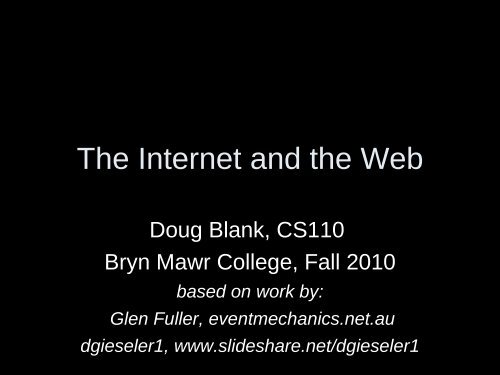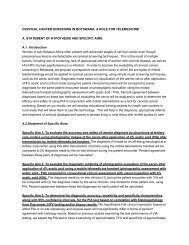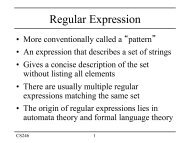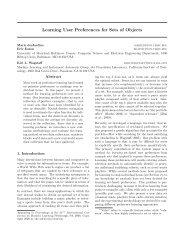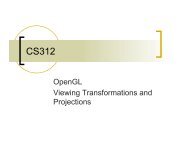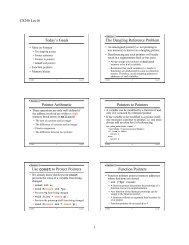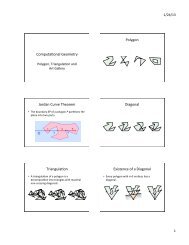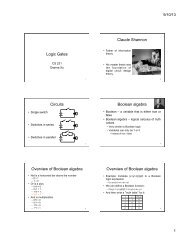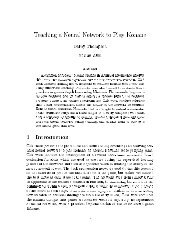The Internet and the Web - Bryn Mawr Computer Science - Bryn ...
The Internet and the Web - Bryn Mawr Computer Science - Bryn ...
The Internet and the Web - Bryn Mawr Computer Science - Bryn ...
- No tags were found...
Create successful ePaper yourself
Turn your PDF publications into a flip-book with our unique Google optimized e-Paper software.
What is a computer network?• Physically connected computers– <strong>Computer</strong>s– Wired connections• “Protocols” that allow <strong>the</strong>se computersto communicate over connections– Agreements on how data is exchanged– Layers of agreements• Low-level (electrical)• Higher-level (software communication)
ARPANET• Started in 1966• “Advanced ResearchProjects AgencyNetwork”• Department ofDefense project• <strong>The</strong> world’s firstoperational “packetswitching network”
Local Network connectingonto global network
E<strong>the</strong>rnet: Low-level protocol• Developed by Dr.Robert M. Metcalfe• Allowed a coaxialcable to move dataextremely fast
TCP/IP: higher-level protocols• Created by VintonCerf <strong>and</strong> Bob Kahn• Allowed diversecomputer networks tointerconnect <strong>and</strong>communicate wi<strong>the</strong>ach o<strong>the</strong>r• “Transmission ControlProtocol” <strong>and</strong>“<strong>Internet</strong> Protocol”
• Sent in 1973 by RayTomlinson• Between 2 PDP-10computers• Tomlinson introduced<strong>the</strong> “@” sign<strong>The</strong> First Email
<strong>Internet</strong> in <strong>the</strong> 70s - 80s• Continue to develop <strong>and</strong> add newprotocols– FTP– Talk– TELNET– Gopher
Gopher• University ofMinnesota(mascot is <strong>the</strong>gopher)• Charge money?• Text only• Archie, searchprogram
• ARPANET ended in1990• Tim Berners-Lee <strong>and</strong>CERN create <strong>the</strong>World Wide <strong>Web</strong>• Hypertext TransportProtocol, HTTP• Hypertext MarkupLanguage, HTMLWWW
“Hypertext” <strong>and</strong> “Hypermedia”• Ted Nelson• Swarthmore grad,1959 Philosophy• Project Xanadu,started 1960• Published 1965
“Memex”Vannevar Bush introduced <strong>the</strong> concept of what he called<strong>the</strong> memex during <strong>the</strong> 1930s, which is a microfilmbased"device in which an individual stores all hisbooks, records, <strong>and</strong> communications, <strong>and</strong> which ismechanized so that it may be consulted wi<strong>the</strong>xceeding speed <strong>and</strong> flexibility. It is an enlargedintimate supplement to his memory." He wanted <strong>the</strong>memex to behave like <strong>the</strong> "intricate web of trailscarried by <strong>the</strong> cells of <strong>the</strong> brain"; essentially, causing<strong>the</strong> proposed device to be similar to <strong>the</strong> functions of ahuman brain. <strong>The</strong> important feature of <strong>the</strong> memex isthat it ties two pieces toge<strong>the</strong>r. Any item can just selectano<strong>the</strong>r immediately.http://en.wikipedia.org/wiki/Vannevar_Bush
World Wide <strong>Web</strong>• Built on top of everything that camebefore– TELNET– E<strong>the</strong>rnet– St<strong>and</strong>ard image protocols (GIF, JPG, PNG)– Mouse– Graphical User Interfaces (GUIs)
World Wide <strong>Web</strong>• Server/Host– Runs special software to serve requests– Apache, PHP, Perl, Python• Client– Runs special software called <strong>the</strong> “browser”– Firefox, <strong>Internet</strong> Explorer, Safari, etc.
A WWW Conversation• Server listens forrequests on aparticular “port”• Browser makes arequest (via link ormanually) via URL• Server gives HTML“code”• Browser renders it
• Composed ofnested “elements”• Textual, notencoded• Start/End tagsHTML “code”
1994 - 2000• <strong>The</strong> <strong>Internet</strong> exploded during this period• <strong>The</strong> first commercial site wasamazon.com• In 1994 <strong>the</strong> World Wide <strong>Web</strong> grew by2300%
“Browser Wars”• Netscape was <strong>the</strong> st<strong>and</strong>ard until 1998• It folded <strong>and</strong> was taken over by AOL• Microsoft <strong>Internet</strong> Explorer captured96% of <strong>the</strong> browser market• IE has recently been challenged by <strong>the</strong>Mozilla browser (aka Firefox)
World Wide <strong>Web</strong>• Early web– Portals– Netscape• Later web– Google– Social networking,etc.
2000 - Present• <strong>The</strong> World Wide <strong>Web</strong> is <strong>the</strong> biggest useof <strong>the</strong> <strong>Internet</strong>– Blogs, News, Video, Shopping, Politics, etc• ...but not <strong>the</strong> only use– Twitter, Gaming, Television, Telephone,Email, IM, distribution channels (torrents)• “<strong>Web</strong> 2.0” - term for modern web use• Many people have a <strong>Web</strong> presence
Is <strong>the</strong> WWW something new?• Sonia Livingstone:– <strong>The</strong> skills <strong>and</strong> conventions requiredto engage with <strong>the</strong> internet may ormay not be new. Commentators aredivided over whe<strong>the</strong>r or not <strong>the</strong>internet offers a radically newinformation <strong>and</strong> communicationenvironment. Hence it remains anopen question as to whe<strong>the</strong>r <strong>the</strong>ability to access, analyse, evaluate<strong>and</strong> create communication contentis common to or different for <strong>the</strong>book, for television, for <strong>the</strong> internet?– http://www.lse.ac.uk/collections/media@lse/pdf/Media@lseEWP4_july03.pdf
Blogs?– Only for losers…?– Different types of blogs (Blood)– Nihilistic impulse, ‘zero comments’Lovink (2007)• Blogged cynicism• “As a micro-heroic, Nietzscheanact of <strong>the</strong> pyjama people, blogginggrows out of a nihilism of strength,not out of a weakness ofpessimism. […] [Blogs are]decadent artifacts that remotelydismantle <strong>the</strong> mighty <strong>and</strong>seductive power of <strong>the</strong> broadcastsystem” (17)– Expression of collectiveintelligence?– http://eventmechanics.net.au
DIY Culture• What is DIY culture?– Makeover culture?(Jones 2008)– Enthusiast cultures?• Participation: Fromaudiences topublics?
DIY Culture• Traditional forms - leaflets, posters,circulars, small circulation journals &magazines, chapbooks, newsletters,Super-8 films• Contemporary forms - zines, blogs,newsgroups & mailing lists• Are YouTube, MySpace, etc. DIY?
DIY Culture1) <strong>the</strong>re are relatively low barriers to artistic expression<strong>and</strong> civic engagement.2) <strong>the</strong>re is strong support for creating <strong>and</strong> sharing whatyou create with o<strong>the</strong>rs.3) <strong>the</strong>re is some kind of informal mentorship wherebywhat is known by <strong>the</strong> most experienced gets passedalong to newbies <strong>and</strong> novices.4) members feel that <strong>the</strong>ir contributions matter.5) members feel some degree of social connection wi<strong>the</strong>ach o<strong>the</strong>r at least to <strong>the</strong> degree to which <strong>the</strong>y carewhat o<strong>the</strong>r people think about what <strong>the</strong>y havecreated.
• Fordmods.com• DIY media/culture isdangerous/unethical/lacks accountability• DIY media has been coopted& commodified bybig business• DIY producersreproduce dominantideologies in <strong>the</strong> guiseof being ‘alternative’• DIY media is beingused to exploit naïveamateurs - especiallyyoung peopleDIY Culture
Gaming Culture• ‘Gaming studies’ emerging field• Ludology vs. Narratology debate• Game as just ano<strong>the</strong>r ‘text’ (Bolter<strong>and</strong> Grusin)• Games as games, with own rules,etc. (Aarseth)– http://gamestudies.org– “Allegorithm” (Galloway 2006: 91-92): Control allegory– Not <strong>the</strong> particular content, but <strong>the</strong>algorithmic logic of computergames– Example: Civilization dubiousethnocentric representations, moreproblematic is <strong>the</strong> way it reduceseverything to quantifiable bits ofinformation– Players internalise <strong>the</strong> ‘rules’ of <strong>the</strong>program
Gaming Culture• Everyday life as a game?• http://www.futureof<strong>the</strong>book.org/gamer<strong>the</strong>ory/• “<strong>The</strong> game has colonized itsrivals within <strong>the</strong> cultural realm,from <strong>the</strong> spectacle of cinema to<strong>the</strong> simulations of television.Stories no longer opiate us withimaginary reconciliations of realproblems. […] Sure, reality TVdoesn’t look like reality, butnei<strong>the</strong>r does reality. Bothbecome a seamless space inwhich gamers test <strong>the</strong>ir abilitieswithin contrived scenarios”(Wark 2007, §7)
Getting Started on <strong>the</strong> <strong>Web</strong>• Register your robot>>> register()• Log in at:myro.roboteducation.org/myweb


